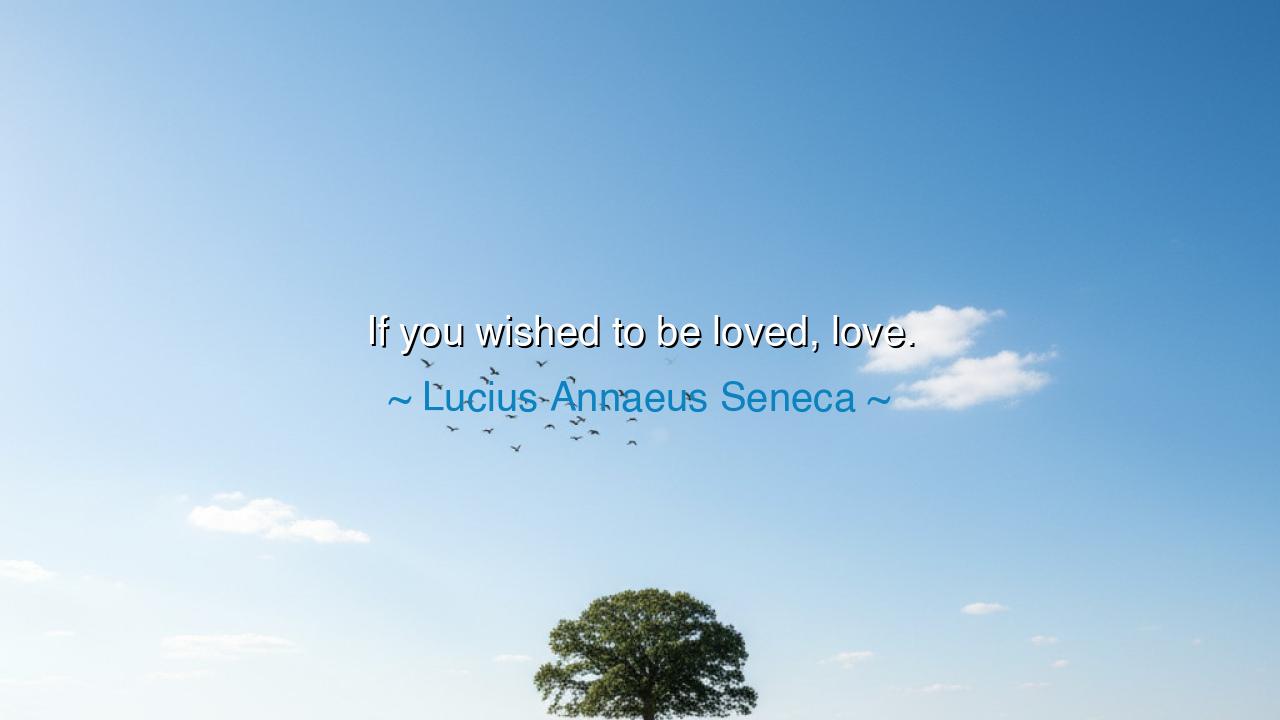
If you wished to be loved, love.






Lucius Annaeus Seneca, the wise Stoic philosopher, offers us a truth that is as powerful as it is simple: “If you wished to be loved, love.” These words reveal the deepest essence of human connection—that love is not something we wait for or seek to receive, but something we must first give. Seneca’s wisdom calls us to understand that love, in its truest form, is not a transaction where we give in hopes of receiving something in return, but a force that flows freely from the heart, without expectation or demand. It is the act of loving that creates the conditions for love to grow and flourish. If you wish to be loved, Seneca teaches, you must first love others unconditionally, for it is through this love that the bonds between us are strengthened.
The ancients understood that love is a reciprocal force—a river that flows in both directions. Plato spoke of love as a journey that starts with physical attraction and grows into a connection with the divine. For Socrates, love was about the pursuit of truth and virtue, something that transcended the self and sought to benefit all of humanity. Both philosophers recognized that love could not be forced, nor could it be based on self-interest. True love, they understood, is a gift given freely, not with the expectation of anything in return. In this way, Seneca’s wisdom aligns perfectly with the philosophy of the ancients: to love is to give of oneself without expectation, and in doing so, one makes space for love to come back to them in abundance.
Consider the story of Alexander the Great, whose conquests brought him glory and admiration across the known world. Yet, it was not just his military might that garnered him respect, but his ability to love and connect with the people he ruled. His love for his men, his desire to see them prosper, and his respect for their contributions were key to his ability to inspire loyalty and devotion in return. Alexander’s love was not limited to those closest to him, but extended to his soldiers, his people, and even his enemies. In this, he exemplified Seneca’s truth: the more you love, the more you receive. The people loved Alexander because he loved them first—he showed them respect, he shared in their struggles, and he led with compassion.
In contrast, consider the story of King Midas, whose love for wealth was bound by greed and self-interest. His desire to possess, to control, and to accumulate was so great that he failed to see that love cannot thrive in a heart consumed by self-centered desires. His wish for everything he touched to turn to gold led to his ultimate undoing. His inability to love beyond his own selfish needs left him isolated, his kingdom increasingly distant, and his life increasingly hollow. Unlike Alexander, Midas was unable to receive love in return, for he never truly gave it. This serves as a poignant reminder of Seneca’s teaching: when we love only for personal gain, we are not truly loving, and love will not find a way to return to us.
Seneca’s quote invites us to reflect on the nature of the love we give. Too often, we seek to be loved without first considering whether we are offering love freely to those around us. Whether in romantic relationships, friendships, or even in the way we interact with strangers, love is the foundation of all meaningful connections. If we walk through life waiting for others to love us, we may find ourselves unfulfilled and disappointed. But when we offer love freely, without expectation, we begin to experience the transformation that love brings—not just in the way it changes those we love, but in the way it changes us.
In your own life, O children, practice love daily. Do not wait for others to offer it to you before you extend it to them. Love your friends, your family, and even strangers, not because you expect something in return, but because love is the most powerful force we possess. When you love without reservation, you create a space for love to return to you, richer and deeper than you could have imagined. Give of yourself freely and openly, for in doing so, you open your heart to the kind of love that transcends conditions and boundaries.
So, O children of the future, remember the wisdom of Seneca: if you wish to be loved, love. Let love be your guiding principle in all things. Love is not a prize to be won; it is a way of being that transforms the world around us. Love deeply, love generously, and love without expectation. In this, you will find that the love you give will come back to you a thousandfold, and the world will become a place where kindness, compassion, and human connection are the bedrock upon which all great things are built. Love—this is the truest path to fulfillment and the greatest gift you can offer.






AAdministratorAdministrator
Welcome, honored guests. Please leave a comment, we will respond soon